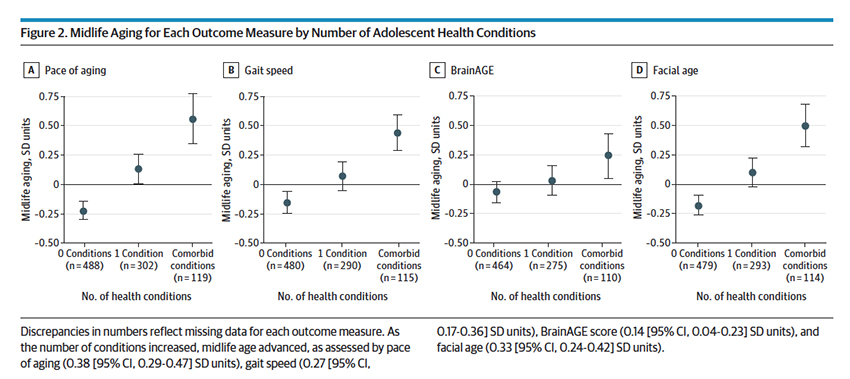“What is the association between adolescent health conditions that are commonly treated by physicians and accelerated biological age at midlife?”
Good question. To find an answer, the researchers looked at a dataset from New Zealand involving the general population in Dunedin, New Zealand, born in early 1972 to early 1973. Assessment was performed 13 times, over varying intervals, from birth to age 45. The cohort was essentially all White, consistent with the ethnicity in the area. The participants all had been assessed for one of four health conditions during adolescence
- Asthma based on diagnosis and symptoms
- Smoking as self-reported
- Obesity based upon a BMI greater than the 95% percentile on pediatric growth charts
- Psychological disorders diagnosed between 11 and 15 include anxiety and depressive disorders, attention deficit and hyperactivity disorders, and conduct disorders.
Biological aging was measured as
- Pace of aging – trends in 19 biomarkers taken four times between age 26 and 45. It included BMI, various blood markers like cholesterol, and physical measures like the ability to force air from their lungs (forced expiratory volume)
- Gait speed – how fast the individual walked on a motorized walkway
- Brain age – as measured by changing brain size, as measured by CT scan, compared to predicted.
- Facial age – a subjective rating of how old an individual looked compared to their actual age of 45
They began with 1037 participants, 938 were alive, and 910 were represented in the data, evenly divided male vs. female.
- Smoking, obesity, and psychological disorders were all associated with accelerated aging. Asthma was not.
- Having more than one condition resulted in greater aging
- Even when adjusting for socioeconomic factors and adverse childhood experiences [1], smoking, obesity, and psychological disorders remained associated with accelerated aging.
- Adolescent smokers saw changes in all four measures of biological aging
- The obese adolescents and those with psychological disorders saw changes in each category, but there was no accelerated brain aging
- Putting some numbers to those qualifiers, the pace of aging was 2.8 months per year faster, were slower walking by 3”/second per year, had a 2.5-year-old brain (in terms of shrinkage), and by those subjective facial ages were 3.9 years older. For comparison, I would offer the clinical rule of thumb that a patient with diabetes ages an additional year for each year with diabetes (A 45-year-old with diabetes for 20 years is physiologically 65).

This study looked at only four common adolescent health issues, so we could possibly find a stronger “signal” considering other health issues, Type 1 diabetes in particular. But there does seem to be some reasonable evidence that these modifiable problems have long-term consequences and to pull out another adage, “that a stitch in time, saves nine.” Addressing these issues, smoking, dietary, and exercise choices, in addition to providing helpful therapy for psychological disorders, may allow us to lead a longer, healthful life. Two problems stand in the way. First, our bias in believing in temporal discounting, gladly paying at age 45 for our “sins,” or at least poor choices in adolescence. Second, we would as a society much rather pay our cardiologists more and our pediatricians less despite whatever we say about caring for “the children.”
[1] Physical, emotional, and sexual abuse. Physical and emotional neglect. Divorce, violent treatment of their mother, an incarcerated relative, substance abuse, and mental illness in the household.
Source: Association of Treatable Health Conditions During Adolescence With Accelerated Aging at Midlife JAMA Pediatrics DOI: 10.1001/jamapediatrics.2021.6417




